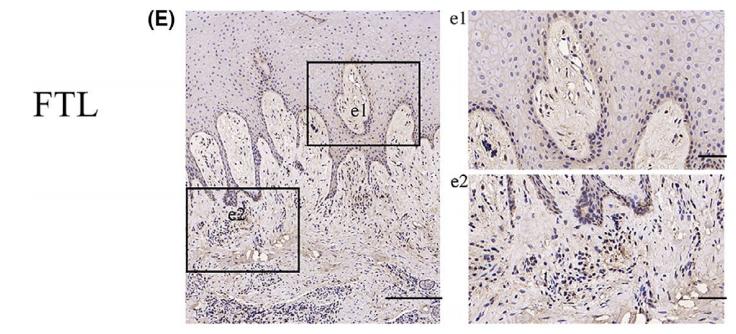Ferritin Light Chain Antibody - #DF6604
| Product: | Ferritin Light Chain Antibody |
| Catalog: | DF6604 |
| Description: | Rabbit polyclonal antibody to Ferritin Light Chain |
| Application: | WB IHC IF/ICC |
| Cited expt.: | WB, IHC |
| Reactivity: | Human, Mouse, Rat |
| Prediction: | Pig, Bovine, Horse, Rabbit, Dog, Xenopus |
| Mol.Wt.: | 19kDa; 20kD(Calculated). |
| Uniprot: | P02792 |
| RRID: | AB_2838566 |
Related Downloads
Protocols
Product Info
*The optimal dilutions should be determined by the end user. For optimal experimental results, antibody reuse is not recommended.
*Tips:
WB: For western blot detection of denatured protein samples. IHC: For immunohistochemical detection of paraffin sections (IHC-p) or frozen sections (IHC-f) of tissue samples. IF/ICC: For immunofluorescence detection of cell samples. ELISA(peptide): For ELISA detection of antigenic peptide.
Cite Format: Affinity Biosciences Cat# DF6604, RRID:AB_2838566.
Fold/Unfold
Ferritin L chain; Ferritin L subunit; Ferritin light chain; Ferritin light polypeptide; ferritin light polypeptide like 3; FRIL_HUMAN; FTL; LFTD; NBIA 3; NBIA3;
Immunogens
A synthesized peptide derived from human Ferritin Light Chain, corresponding to a region within C-terminal amino acids.
- P02792 FRIL_HUMAN:
- Protein BLAST With
- NCBI/
- ExPASy/
- Uniprot
MSSQIRQNYSTDVEAAVNSLVNLYLQASYTYLSLGFYFDRDDVALEGVSHFFRELAEEKREGYERLLKMQNQRGGRALFQDIKKPAEDEWGKTPDAMKAAMALEKKLNQALLDLHALGSARTDPHLCDFLETHFLDEEVKLIKKMGDHLTNLHRLGGPEAGLGEYLFERLTLKHD
Predictions
Score>80(red) has high confidence and is suggested to be used for WB detection. *The prediction model is mainly based on the alignment of immunogen sequences, the results are for reference only, not as the basis of quality assurance.
High(score>80) Medium(80>score>50) Low(score<50) No confidence
Research Backgrounds
Stores iron in a soluble, non-toxic, readily available form. Important for iron homeostasis. Iron is taken up in the ferrous form and deposited as ferric hydroxides after oxidation. Also plays a role in delivery of iron to cells. Mediates iron uptake in capsule cells of the developing kidney (By similarity).
Belongs to the ferritin family.
Research Fields
· Cellular Processes > Cell growth and death > Ferroptosis. (View pathway)
· Cellular Processes > Cell growth and death > Necroptosis. (View pathway)
· Organismal Systems > Digestive system > Mineral absorption.
References
Application: IHC Species: Human Sample: gingival tissues
Application: IHC Species: human Sample: tumor tissue
Restrictive clause
Affinity Biosciences tests all products strictly. Citations are provided as a resource for additional applications that have not been validated by Affinity Biosciences. Please choose the appropriate format for each application and consult Materials and Methods sections for additional details about the use of any product in these publications.
For Research Use Only.
Not for use in diagnostic or therapeutic procedures. Not for resale. Not for distribution without written consent. Affinity Biosciences will not be held responsible for patent infringement or other violations that may occur with the use of our products. Affinity Biosciences, Affinity Biosciences Logo and all other trademarks are the property of Affinity Biosciences LTD.















